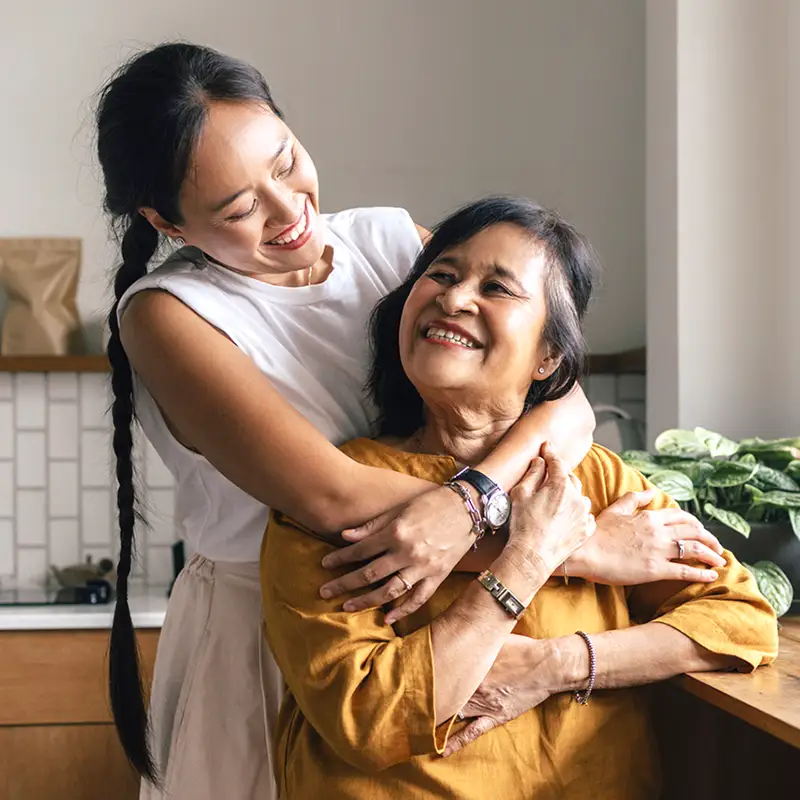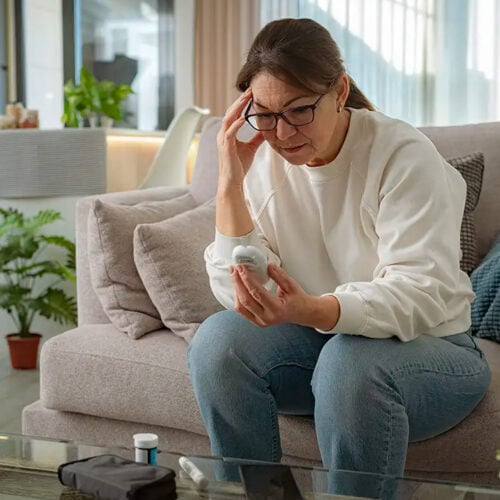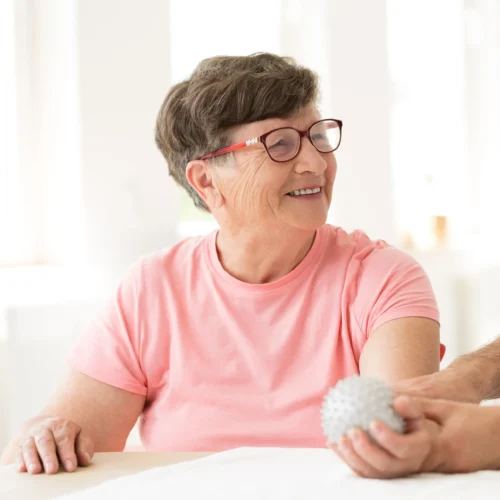Caring for a stroke survivor
Supporting your loved one after stroke
If your loved one has had a stroke, you’re probably wondering how you can best support them. Stroke survivors face significant challenges, and as their caregiver, you have the ability to be a strong support system. One of the most important ways to help is by understanding how to provide emotional support during their recovery.
What is a care partner?
At Kandu Health, we define a care partner as an unpaid friend or family member sharing care for someone living with the effects of a stroke. The care partner takes a role in managing the stroke survivor’s health and recovery.
We use the term care partner instead of caregiver because we recognize that you and your survivor act as a team during recovery. Stroke survivors may identify one or more care partners and those care partners may change over time based on bandwidth and the survivors’ needs. Kandu is committed to maximizing each survivor’s agency over both their identity and health and uses the term ‘care partner’ to reinforce this idea.
Don’t blame the stroke survivor
Each year, an estimated 888,000 people in the U.S. experience a stroke, and this number is expected to rise. Anyone, including people you know—or even yourself—could have a stroke at some point.
It’s crucial to understand that the stroke survivor did not cause their stroke. Even if someone has engaged in unhealthy behaviors, a stroke can be triggered by numerous other factors. While there are steps like eating healthy, quitting smoking, and taking medication that can lower the risk of a stroke, they don’t guarantee prevention.
Blaming the survivor isn’t helpful. You might feel that they need to change their habits, but real, lasting change must come from within. When people make changes out of fear or pressure, those changes often don’t stick. Trying to force “healthy” choices could cause more harm than good.
Instead, support the survivor by focusing on their values. Rather than warning them they’ll have another stroke if they don’t change, ask what’s important to them. Focus on what they want to add to their life, not what needs to be taken away.
Allow them to be where they are.
Don’t expect stroke survivors to be constantly inspiring, brave, or happy. They’ve gone through a traumatic event and need time to grieve. Putting pressure on them to always be uplifting or positive can lead to feelings of inadequacy if they don’t meet those expectations. Stroke survivors don’t need pity, toxic positivity, or unsolicited advice. What they do need is empathy, respect, and dignity.
Even though you may not fully understand what a stroke survivor is going through, you can listen and show empathy. Stroke survivors don’t need to be “fixed”—they need to be heard.
Try to understand the emotional burden
The mental health impact of a stroke is significant. Depression, which is often chemical and biological, is a common consequence after a stroke, regardless of external factors. Many stroke survivors also struggle with anxiety and post-traumatic stress. Having faced a near-death experience, they often deal with unresolved emotions.
Family members and care partners may also experience stress, anxiety, and even depression as they navigate the changes in caring for a loved one with a disability. This can strain relationships. Stroke survivors and their care partners need understanding as they face these new challenges.
Remove barriers instead of ‘fixing’
After a stroke, both survivors and their families often focus on “getting back to where they were.” However, recovery is not about “fixing” the person—it’s about addressing the social and environmental barriers that limit their participation in society. Stroke survivors face challenges such as discrimination, physical barriers, and social isolation, which can cause frustration and feelings of helplessness.
Recovery is personal, and what matters most is quality of life and the ability to participate in activities. Focus on removing barriers that make social participation difficult for your loved one. Include them in decisions, and let them choose their level of involvement.
It can be challenging for survivors to access public spaces or transportation, and they may struggle to find employment. Feeling excluded from activities they previously enjoyed can be painful. Instead of organizing events that might be inaccessible, do what you can to remove barriers and support inclusion.
Respect their autonomy
It’s natural to want to help a stroke survivor in any way possible, but it’s important to respect their autonomy. Decisions should be made collaboratively, with the survivor’s preferences and goals in mind. While you can offer support and guidance, ultimately the decision should be theirs. Even if their decision-making process is slower than you’re used to, be patient and avoid frustration—this will help protect their sense of agency.
Recovery from a stroke isn’t linear, and survivors will have different needs at different stages. Flexibility and ongoing communication are key to providing the right kind of support. By respecting their autonomy, you help foster their sense of dignity and well-being.
In some cases, family therapy or other resources might be necessary to help rebuild relationships and address the emotional challenges that can arise. Stroke survivors face obstacles like mental health struggles, social isolation, and even hurtful actions from loved ones, which can delay recovery. They need to build a network of “safe people” who support their recovery without draining their energy.
How to be a safe person for a stroke survivor
Being a safe person for a stroke survivor means offering more than just medical support—it involves empathy, understanding, and respect. Here’s a guide to help you become a safe person for someone in stroke recovery:
Listen, don’t fix
Avoid trying to “fix” the stroke survivor. They don’t need solutions from you, as they have a team of professionals and advocacy support from Kandu to guide their recovery. What they need most is someone to listen to them.
Respond with confidence and calm
When asked for help, offer assurance. A calm presence provides them with a sense of stability.
Offer empathy over advice
Survivors need to feel heard and understood, not given unsolicited advice.
Be reliable
Stroke survivors need to trust that you’ll be there when you say you will.
Be mindful of your questions
Ask questions in a thoughtful and sensitive way, with genuine curiosity and kindness. Avoid questions just to satisfy your curiosity; only ask if it truly serves the survivor’s needs and experience. You are not entitled to someone’s story just because you’re curious.
Be clear about your support
It’s okay if you can’t do everything—everyone has their own responsibilities. Overextending yourself can lead to resentment. Be honest about your availability, and don’t overcommit.
Be flexible
Stroke survivors often experience post-stroke fatigue and may need to cancel at the last minute. Be understanding about their energy levels and respectful of their time, adjusting yours when possible.
Value them for who they are
Let the survivor know you value them as a person. During this time, they need to hear and feel that appreciation.
Understand they’ve had a unique experience
Recognize that their experience is different from anything you might fully understand. Instead of trying to relate, accept their experience with compassion and kindness.
Be patient and let them speak for themselves
Don’t speak for the survivor, rush them, guess their words, or fill in pauses. Give them the time they need to speak, and redirect conversations back to them if others talk to you instead of directly to the survivor.
Maintain genuine connections
Show up authentically in your interactions, and take breaks if you feel stressed or unsure. A safe person feels a genuine connection with the stroke survivor. If you feel frustrated, stressed, or overwhelmed, take time for yourself rather than exposing the survivor to those feelings.
Self-reflect
Regularly ask yourself, “Am I a safe person for the survivor?”
Not everyone will meet these guidelines perfectly, but striving to be a safe person can greatly support a stroke survivor’s recovery, helping them feel valued, understood, and supported.
Support for stroke survivors and their care partners
Kandu’s stroke recovery services offer comprehensive support for both stroke survivors and their care partners. Our experienced doctors, nurses, and navigators take the time to understand your individual needs, developing personalized recovery plans and providing essential resources to help make recovery a lot smoother.



